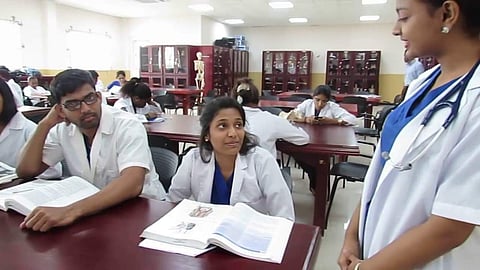

With the Coronavirus in China officially making it to the global outbreak category, many Indian students have returned to the country. WIth their medical studies stuck in limbo, here's a curious new development — the Texila American University, run by an entrepreneur from Coimbatore, recently announced that they are ready to admit such students and are ready to give credit to the courses they have completed during their stay in China. We talk to Dr Dheeraj Bhansal, Dean, Guyana Campus, Texila American University about their new policy and how it may just change the life of Indian medical students.
Excerpts from the interview:
You have offered to admit Indian students who have returned from China. Can you tell us what the process is?
First of all, we need to ensure the students who came back from China are healthy and not suffering from any illness. Health should be the top priority. Once they have rested/recovered and have been cleared by health authorities, they should look into alternative medical schools to continue their dream of becoming a doctor.
In my opinion, they should consider the following:
a. The medical school is not very expensive as compared to where they have been studying so far
b. The medical school is located in an English speaking nation, so that they will not have problem interacting with patents during clinical training
c. A medical institution which is willing to give the credit for the courses they have completed during their stay in China
There are many schools which can fulfill the above criteria which they can search for online. One such school is Texila American University Medical School in Zambia, which is economically affordable, located in an English-speaking country, maybe 5 hours flight away and is willing to consider credits earned in medical education so far by the student so that they do not lose the time and money they have already invested in medical education.
Fear about the spread of Coronavirus is omnipresent now. What should our doctors focus on to be prepared for an epidemic like this?
Ignorance and fear which stems out of it is the biggest factor in making the situation worse. First of all the doctors must try to educate and make people aware of how Coronavirus spreads. For example, it has only 3 to 12% mortality, which means the majority of people getting infected by it are not likely to die from it. As known to everyone, prevention is better than cure, therefore doctors must educate people regarding how they can prevent themselves from getting the infection. Wash your hands regularly, avoid overcrowded and poorly ventilated spaces and if you get fever and other flu symptoms, consult a doctor immediately. Moreover, in the unfortunate event of an epidemic, we should be ready with enough beds, medical personnel and other medical and quarantine facilities.
How will the new regulation help the MBBS aspirants who wish to study abroad?
It will make the process of our students going abroad to study medicine more streamlined and make the medical schools they are joining abroad more accountable. It would also encourage the Indian students to work harder and thus hopefully reduce the number of students making it back and not being able to clear the MCI FMG exam.
What is the difference between Indian and western medical education systems?
Medical education in India is going through a transition phase. Having worked both in Indian and western medical education system, I could appreciate the fact the medical education in India was still based on traditional systems whereas in the western world it had changed with time with a larger emphasis on doctor-patient relationship and communication skills. Having said that, with recent changes suggested by the MCI the current medical education curriculum in India, it seems more at par now with the western curriculum.
What can we do to improve the public health sector to make it more affordable to people?
Increase awareness about the importance of public health in all sectors. More awareness will increase demand and this demand will lead to more and more institutions offering public health courses to meet the demand. As more institutions offer these courses, the healthy competition among them will make it more affordable. Moreover, government organisations should also offer more public health courses at an affordable cost for individuals from medical as well as social background. In our high school curriculum, children should be exposed to public health and its importance and should be projected as a career option to them.
